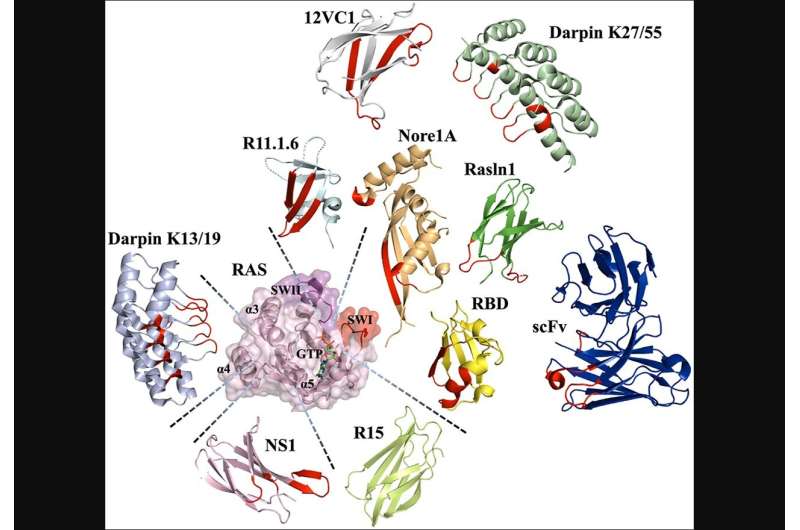This article has been reviewed according to Science X's editorial process and policies. Editors have highlighted the following attributes while ensuring the content's credibility:
fact-checked
peer-reviewed publication
proofread
Targeting ras with protein engineering

A review paper titled "Targeting Ras with protein engineering" has been published in Oncotarget.
Ras proteins are small GTPases that regulate cell growth and division. Mutations in Ras genes are associated with many types of cancer, making them attractive targets for cancer therapy. Despite extensive efforts, targeting Ras proteins with small molecules has been extremely challenging due to Ras's mostly flat surface and lack of small molecule-binding cavities.
These challenges were recently overcome by the development of the first covalent small-molecule anti-Ras drug, sotorasib, highlighting the efficacy of Ras inhibition as a therapeutic strategy. However, this drug exclusively inhibits the Ras G12C mutant, which is not a prevalent mutation in most cancer types. Unlike the G12C variant, other Ras oncogenic mutants lack reactive cysteines, rendering them unsuitable for targeting via the same strategy.
In this review, researchers Atilio Tomazini and Julia M. Shifman from The Hebrew University of Jerusalem discuss protein engineering as a promising emergent method to target Ras, since engineered proteins have the ability to recognize various surfaces with high affinity and specificity.
"While the development of small-molecule Ras inhibitors has been reviewed elsewhere, we focus our review on protein-based Ras inhibitors, describing the methods for their engineering, various scaffolds used for inhibitor design, and prospects for delivery of the designed Ras inhibitors into the cellular cytoplasm, where Ras is located," the researchers state.
Over the past few years, scientists have engineered antibodies, natural Ras effectors, and novel binding domains to bind to Ras and counteract its carcinogenic activities via a variety of strategies. These include inhibiting Ras-effector interactions, disrupting Ras dimerization, interrupting Ras nucleotide exchange, stimulating Ras interaction with tumor suppressor genes, and promoting Ras degradation. In parallel, significant advancements have been made in intracellular protein delivery, enabling the delivery of the engineered anti-Ras agents into the cellular cytoplasm.
"These advances offer a promising path for targeting Ras proteins and other challenging drug targets, opening up new opportunities for drug discovery and development," the researchers conclude.
More information: Atilio Tomazini et al, Targeting Ras with protein engineering, Oncotarget (2023). DOI: 10.18632/oncotarget.28469




















